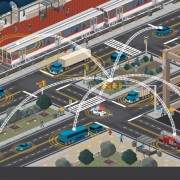Self-Driving, Connected Cars Are The Big Buzz at Beijing Auto Show
Jennifer van der Kleut
The Beijing International Automotive Exhibition is happening this week, and self-driving and connected cars appear to be the big-ticket items on most people’s minds.
Perhaps one of the biggest reasons for all the buzz is the fact that one self-driving car traveled roughly 2,000 kilometers to get itself to the show. A driverless car manufactured by Changan Automobile completed the six-day journey from its headquarters in Chongqing to Beijing for the show, according to the South China Morning Post.
The article says in addition to cameras and radar that allowed the car to maneuver through traffic and change lanes, the car is also capable of recognizing traffic signs and even following voice commands.
In total, a movement called “Internet Plus” seems to be permeating China’s automotive industry, as more and more automakers announce work on self-driving and connected-car technology.
For example, Chinese online video and smartphone maker LeEco, formerly know as LeTV, also showed off its first concept car at the event-a self-driving, electric vehicle, news outlets are reporting.
Cars with connected technology were also big stars of the auto show. The Roewe RX5 SUV by Chinese automaker SAIC debuted to much buzz. The car is run by Alibaba’s YunOS operating system, which reportedly has an impressive ability to process big data. As the Wall Street Journal reports, SAIC touts the car as “the car that understands you best.”
And speaking of SUVs — to the surprise of some, big cars seemed to be all the rage. A number of SUVs have already been unveiled at the show, including two new models by Honda Motor Co.
However, off-roading does not necessarily seem to be the target terrain for many of the new SUVs being shown off during the event. As the Detroit Free Press reports, the aim appears to be space and luxury for many of them.
“Ford, Volkswagen, General Motors and China’s Chery also displayed new SUVs, many never meant to be driven off-road and equipped with heated seats, Web-linked navigation, entertainment centers and other features,” the Free Press said.
These early reports are already coming out of the show, but there is likely much more to come, as the show runs through May 4.

